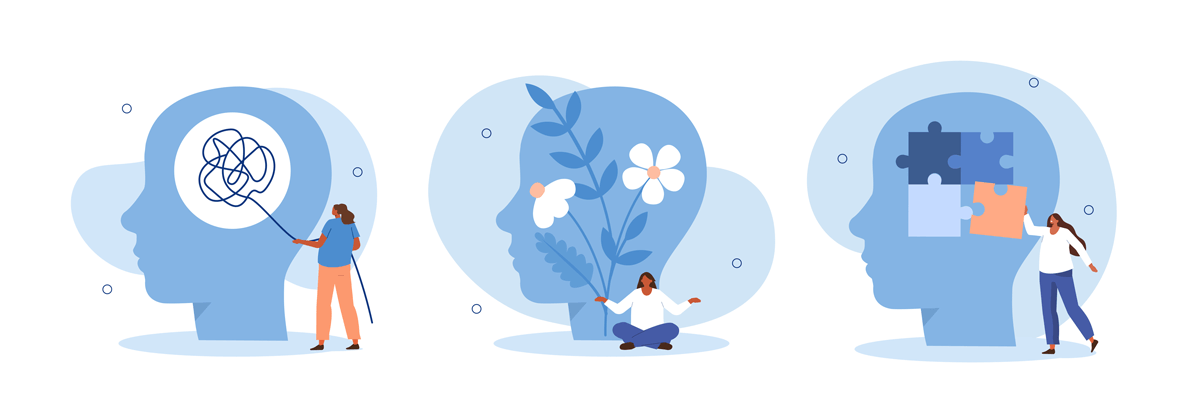
Mental Health Awareness Month
Mental Health Awareness Month is observed annually in May to promote awareness and education about mental health, reduce the stigma surrounding mental health issues, and encourage individuals to seek help when needed. Mental Health Awareness Month provides an opportunity to educate individuals about the impact of mental health on their overall well-being and to highlight the resources and services available to support their mental health needs. This month-long observance is an essential reminder that mental health is a critical aspect of our overall health and well-being and that it is okay to seek help when needed.
Why is it important to educate and promote awareness?
Mental health is a crucial component of overall health and well-being. According to the National Alliance on Mental Illness (NAMI), 1 in 5 adults in the United States experiences mental illness each year, and 50% of all lifetime cases begin by age 14. These statistics demonstrate the importance of mental health awareness and screening for typical mental health issues.
One of the most significant concerns regarding mental health might be its impact on youth. Mental health issues in youth can have severe consequences, including academic failure, substance abuse, and suicide. According to the Centers for Disease Control and Prevention (CDC), suicide is the second leading cause of death among individuals aged 10-34 in the United States. Additionally, mental health issues often go untreated in youth, significantly impacting their quality of life and future prospects.
Social media has become an integral part of our daily lives, and while it can have many benefits, its impact on mental health is a growing concern. One of the biggest concerns is the potential for social media to exacerbate feelings of isolation, depression, and anxiety. Social media can create a distorted view of reality, where individuals constantly compare themselves to others and feel inadequate. This can lead to a negative impact on self-esteem and mental health. In addition, social media can be addictive, leading to decreased sleep, increased stress levels, and a lack of productivity. The use of social media has also been linked to cyberbullying, which can have serious mental health consequences. While social media has many benefits, it is important to be aware of its potential impact on mental health and to ensure that social media use is balanced with other healthy habits, such as exercise and face-to-face social interaction.
The impact of mental health issues on vulnerable populations is equally concerning. Vulnerable populations include significant socioeconomic barriers, such as poverty, lack of access to education and healthcare, and discrimination. These populations often face higher rates of mental health issues than the general population. For example, according to the Substance Abuse and Mental Health Services Administration (SAMHSA), adults living below the poverty line are more than twice as likely to experience serious psychological distress than those living above the poverty line.
It has become all too common to see news reports of mass shootings in America. These tragic events have left countless families grieving and communities traumatized. While the root causes of such incidents are complex, mental health has often been identified as a contributing factor. Many of the shooters involved in these tragedies have reportedly struggled with mental health disorders. This highlights the critical need to address mental health issues in our society and ensure that those needing mental health care have access to it.
The current mental health crisis in America cannot be ignored, and it is imperative that we take action to improve the quality and accessibility of mental health services for everyone. By doing so, we may prevent future tragedies and help those struggling with mental health to lead healthier, happier lives.
About Our Clinic
At NAG Clinics, we understand that mental health is vital to overall wellness. That is why we offer therapy for families and pediatric patients who may need it. We recognize that mental health issues can impact individuals of any age, and we believe that early intervention is key to promoting positive outcomes. Our Behavioral Therapist, Tamara Ceaser, is dedicated to providing compassionate, evidence-based care to help individuals and families overcome mental health challenges and improve their quality of life. Whether you’re struggling with anxiety, depression, or other mental health concerns, our therapy sessions can provide the support and guidance you need to heal and thrive.
About Our Founder
Ashu Syal, MD is the founder and Medical Director of NAG Clinics, a state-of-the-art medical practice offering comprehensive urgent care, pediatric and family practice in Pasadena and Texas City, Texas. With over 20 years of experience as a board-certified pediatrician, Dr. Syal aims to provide exceptional care to families and children with the highest expertise and compassion. Her friendly and welcoming nature helps patients feel at ease, and she is highly regarded in the medical community for her expertise and dedication to patient care.